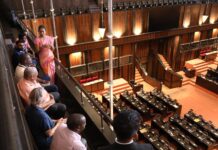Sri Lanka’s High Commissioner to the UK, Saroja Sirisena, hailed the country’s ‘phenomenal’ healthcare response and said she was hopeful it was ‘on track’ to take it off the UK’s red list from September.
Saroja Sirisena told ‘Travel Weekly’ that when a country has gone through something, it comes out better prepared for things in the future.
The High Commissioner stated:
“We have been really disciplined with Covid. Our approach was criticised by some because we got the military involved to handle some sections of the operation, but we moved really quickly.
We shut our airports and wouldn’t even let Sri Lankan nationals back in. The army set up hospitals in 10 days, and our healthcare system was phenomenal.
There were about 20,000 Brits who actually opted to stay in Sri Lanka as they felt safe there. We had only 13 or 14 deaths until October last year.
Current entry requirements to Sri Lanka are two vaccinations, a negative PCR test prior to travel and a negative PCR test on arrival, with one day in quarantine while awaiting results.
We will have everyone over the age of 30 double-vaccinated by September. People will still test positive but the number people getting ill will be much lower and so hospitals will not be overwhelmed.”
Ms. Sirisena also said Sri Lanka offered Brits a great option for travel once the world opens up and expects visitors to stay longer post-Covid.
“The average length of stay is currently seven days, and they tend to do two activities – maybe the city and the beach. But we think once this is over and people have travelled that far, they will stay a little longer and do maybe three activities – adding in trips to the rural interior to the tea plantations or to see wildlife,” she said.
Ms. Sirisena also said Sri Lanka offered great active and adventure options, such as cycling, white water rafting and tours to tea plantations and standards in the country were very high.
“Our rural is rural, but not backward. It’s beautiful and untouched but there is still electricity and internet connection,” she also noted.
“Visitors won’t see unpleasant things. They are most likely to see kids in uniform walking through the rice fields to school,” she also highlighted.











